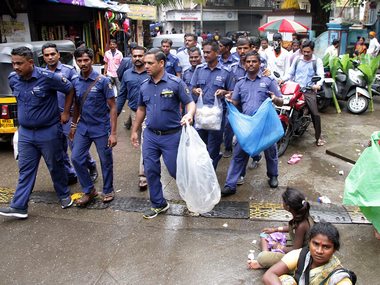The Maharashtra Pollution Control Board (MPCB) on Sunday instructed its officials to initiate action against plastic manufacturers and consumers violating the ban imposed on the product in the state. The direction comes as the deadline to set up a buyback mechanism to collect plastic used by retailers as well as in multi-layered and tetra-packaging ended on Sunday. According to DNA, the police has been asked to enforce the ban strictly, penalising those found violating the law. The notification on the plastic ban was out in March this year, and the implementation was ordered in
June . The state government had imposed a ban on the manufacturing, use, sale, distribution and storage of plastic materials such as one-time-use bags, spoons, plates, PET and PETE bottles and thermocol items. The ban came into place on 24 June. However, the police have been going slow on the defaulters as Mumbaikars remained befuddled about the dos and don’ts of the ban. Four months on, the situation seems to have hardly improved as the Maharashtra government is gearing up to implement the plastic ban with full force. We simplified what this means for residents of Maharashtra. [caption id=“attachment_4584461” align=“alignleft” width=“380”] Representational image. Reuters[/caption] The quantum of punishment To
ensure adherence to the ban by manufacturers , small businesses and citizens, the government has imposed fines of up to Rs 25,000 and a three-month sentence for regular offenders. First- and second-time offenders are to be charged Rs 5,000 and Rs 10,000, respectively. Repeat offenders will be produced before a court, which will decide the quantum of the penalty. Between 23 June and 31 August, despite the moderate implementation of the ban on plastic products, the Brihanmumbai Municipal Corporation (BMC) seized 17,084 kilogrammes of plastic and collected Rs 97,75,000 as fine. What’s banned and what’s not The
exemptions include plastic used for medicine packaging, food grade plastic, compostable bags for agriculture as well as plastic used to deal with solid waste, and that used for manufacturing and exporting purposes. On 25 June, Maharashtra Environment Minister Ramdas Kadam agreed to exempt thermocol used for decoration purposes and fish storage. Meanwhile, the products that are completely banned — the list of which was first issued by the Devendra Fadnavis-led government in
March — are all kinds of plastic bags (both with and without a handle), all plastic or thermocol cutlery such as spoons and plates, non-woven polypropene bags, food containers, plastic packaging, and PET and PETE bottles. Plastic packaging used to wrap and store the product is also included in the ban. Govt to go after manufacturers using plastic packaging Apart from end consumers, to ensure effective implementation of ban, the state government has also decided to weed out the use of plastics at the source by ensuring proper enforcement of the guidelines by various product manufacturers who still use plastic in packaging their products. An MPCB official said
retailers are expected to print the manufacturers name, type and buyback price on the plastic they use. “Besides, they are expected to put in place a mechanism to collect plastic and ensure recycling. We will see whether they are following this,” the official said. Another official said that in case of multi-layered and tetra packaging, the manufacturers, or brand owners, or producers need to submit their Extended Producers Responsibility (EPR) plan, which involves modalities of a waste collection system, to the Urban Development Department for approval. “So far, we haven’t received a single approval letter,” the official said, adding that manufacturers were issued notices to submit their EPR plan in August. The official also said that the government has decided to hold region-wise, inter-departmental coordination meetings with all officers empowered to take action as per the notification.
The Maharashtra Pollution Control Board (MPCB) Sunday instructed its officials to initiate action against plastic manufacturers and consumers violating a ban imposed on the product in the state
Advertisement
End of Article


)

)
)
)
)
)
)
)
)



